I have never written about my mother before. Her story is the one story in my life that has always haunted me.
Editor's note: Warning, this article contains explicit details some readers may find uncomfortable.
As mental health issues have become vast and far-reaching in our world I felt it was time to finally share her story and the ripple effect it had on my childhood.
I'd like to share my mother's story. I hope to inspire others to share their stories as well.
I could not tell my mother's story without including my father and the sacrifices he made. My father’s mother immigrated to America from County Leitrim and she then died in childbirth in New York. After his father died a year later he was separated from his siblings and placed in an orphanage in the Bronx. He was never adopted. That was a tough life in itself, but he had no idea the difficulties he would face years later as he watched the woman he loved suffer from mental illness.
My parents, Edwin and Patricia Concannon met on a blind date in Queens, New York, and they married in 1957. My mother was tall, beautiful and she dressed impeccably as she went to work for Con Ed in Manhattan each day.
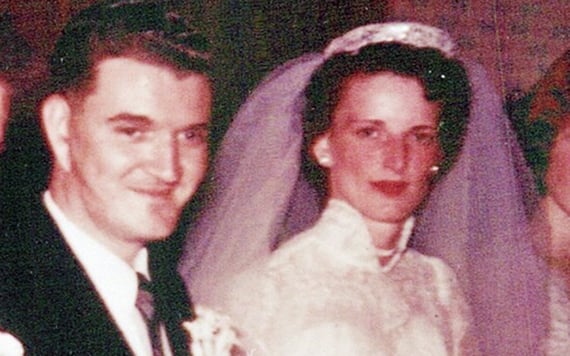
Edwin and Patricia Concannon got married!
My sister, Eva, was born in 1960, and I followed in 1961. My father said he didn't know which came first: the postpartum depression or the manic-depressive disorder (bipolar), but her illness first surfaced after Eva's birth. While mental health illnesses have become more accepted in the last fifty-plus years, my father found himself with little support back in the sixties.
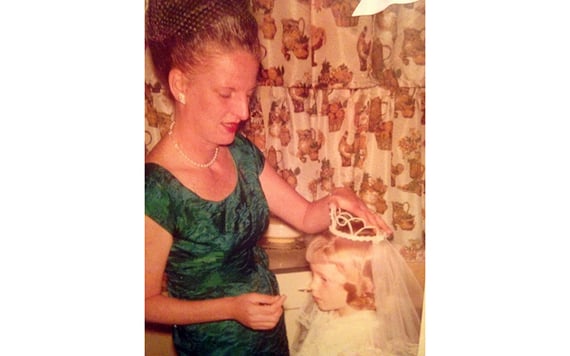
Patricia and her daughter Eva.
I do not know how he managed to work full time, care for my mother and raise two daughters.
My father woke up early to make sure my sister and I had a hot breakfast before school each day. He helped us with our homework each night and on the weekends, he took us on long day trips into Manhattan just to take us out of an unpleasant and at times, unsafe environment.
I remember being five years old watching my mother pick a fight with my father. He did what he usually did – calmly try to talk to her. She escalated the argument and went into the kitchen and returned with a large knife. I was crying and I threw myself in front of my father with my arms stretched out in an attempt to protect him. He instantly knew this was a bad idea and he pushed me aside and twisted her arm until the knife fell to the floor.
I ran down a flight of stairs and rang a neighbor’s doorbell, I cried, "She going to kill him this time." They called the police and tried to calm me down. A few minutes later an officer told me to go back home and as I climbed the stairs to our apartment another officer patted my head as he went down the stairs, "It's alright honey – you can go home now." When I returned to our apartment my mother was serving dinner in our dining room and they were just waiting for me. No one explained what happened. No one spoke about it again.
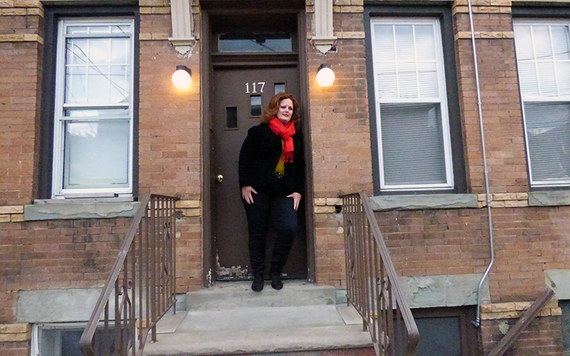
Kathleen visiting her old family apartment in Guttenberg, NJ.
When I was six years old and Eva was seven my mother would cry each morning as she got us ready for school. She always made sure my sister and I were dressed meticulously and our hair looked perfect. It was the same routine every day. She would begin to cry and tell us she was sorry for what was going to happen on that day and what we would find when we came home from school that afternoon. She calmly stated she had no choice but to kill herself and when we came home from school we would find her dead. She even told us how it would happen, "When you get close to the house look into the basement through the window and you'll see my feet dangling from the big silver pipe."
We never told our father she said that to us, but I remember stopping at the corner of our home and crying each day after school too afraid to go home and even more afraid to approach the basement window. One-day Eva asked, "Why do you stop here every day and cry? Is it because of what she says about hanging herself?" I nodded, yes. Eva added, "She has been saying that for two years and she never does it." While Eva's perspective made me feel better, as I got closer to our apartment building my eyes always went straight to the large silver water pipe. And, while I felt relief upon seeing it intact, I still felt dread to go inside our apartment. I never knew what we would find. Some days we would go home and as she sat in a chair in the kitchen chain-smoking my mother belittled me constantly saying things like, "You always stick up for him, don't you? You are just Daddy's Little Girl, aren't you?"
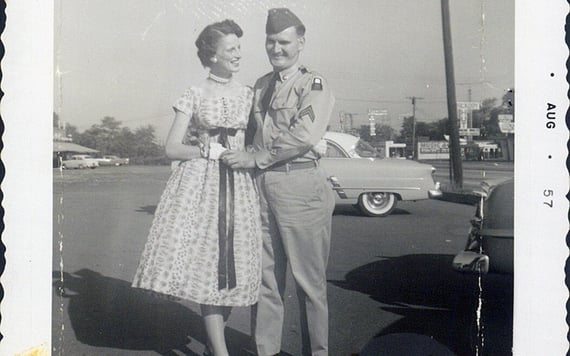
Edwin and Patricia Concannon in happier times.
On other days we would come home and she would be passed out drunk on the kitchen floor. We never saw her drink alcohol. It was so confusing to me. One-day Eva and I kicked her softly with our feet trying to turn her over and I asked Eva, "Is she dead?" Eva confirmed she wasn't and we left her there and went inside and watched "Batman" on television. We knew our father would make us dinner when he came home after work.
Some nights while I was trying to sleep in our tiny railroad room apartment, I could hear her yelling out to God, "Please just take me tonight. Please send the angels to take me to heaven." I quietly cried in my bed and folded my hands in prayer begging God to ignore her prayers and listen to mine.
Other times my mother would describe in vivid detail what it was like to get shock treatments, "They tied me to the table and they put a mouthguard in my mouth to make sure I didn’t bite my own tongue off. Please don't let them do that to Mommy again." Then she cried and begged us to lobby our father to be sure she would never have shock treatments again. When I asked why they did that to her she told me, "So I can forget things."
I thought she wanted to forget us.
When she was in the psychiatric hospital she insisted my father bring us there to visit. He didn't want to. My sister and I would slowly walk through the thick clouds of cigarette smoke toward our mother and we would sometimes giggle at the other patients when they acted funny. Some patients, like our mother, just looked out the window while chain-smoking as others played board games with each other to pass the time. They all seemed happy to see two young children. It was very confusing to me when she was nice to us during her hospital stays. Back at home she usually wasn't as nice.
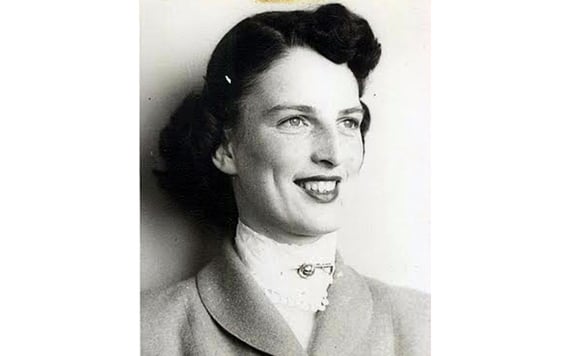
Patricia, photo taken in 1955.
I also remember the many times she would get so frustrated washing my thick hair in the bathtub and it usually ended with her almost wrestle with me. I would scream and cry and my instinct was fear. My father always came running into the bathroom and would calmly take over washing my hair. He called me Sunshine and would sing me a happy song until I laughed. A few days later she walked me into a beauty parlor and as I begged her not to she instructed them to cut my thick hair as short as they could. I cried for days and thought I looked like a boy.
My father would also try to encourage her to tell her psychiatrist about her childhood but she would not. My mother was born in 1932 in New York to Helen Gallagher and James Naughton. She was one of eleven children. James didn't stick around much and Helen was left raising the children alone. I'm not sure if some of the children were taken away by protective care or if Helen willingly gave them away, but my mother said she along with the other girls were given away by their mother.
She felt abandoned by her mother and later by her siblings. A wonderful older widow from Long Island, Eva Abbott, took in my mother and her sister, Rita. After Rita became too difficult to handle she was placed in Pilgrim State Hospital, a psychiatric hospital in Brentwood, New York. Rita spent most of her life there. My mother saw her only a handful of times after that.
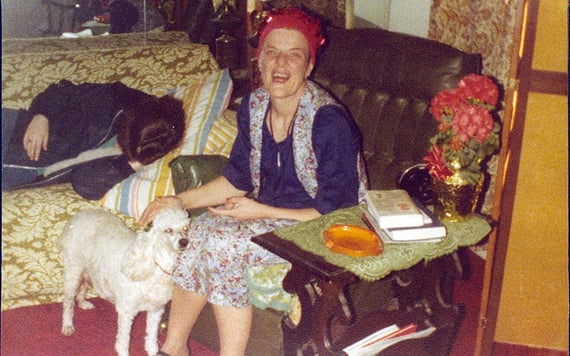
Patricia’s sister, Rita, visiting from hospital.
Helen Gallagher, the grandmother I never met, lived a long life and was doted on by her sons and their children later in her life. With the exception of one or two visits to see her mother, my mom was not included as a family member. It hurt her so much and her abandonment issues were deep-rooted and long-lasting.
As time passed and Eva and I grew older, the expense of raising two teenagers forced my father to work two jobs. I didn't want to be home with my mother because of the constant verbal abuse. I was too young to get a job that paid but I didn't care about the money. I just wanted someplace to go after school. I lied about my age and landed an interview to be a volunteer candy striper at a local nursing home. I was looking for an escape from my home life. The holidays were usually dreadful at our apartment so I also wanted a place to go on holidays.
On my first day as a candy striper, the woman who hired me told me I would be assigned to the sixth floor. She said, “With the crazies.” Hudson Manor Nursing Home, in North Bergen, NJ had six floors and while the first five floors were a traditional nursing home, the sixth floor was where they housed the patients who had more severe mental illness, according to the woman who hired me. She told me, “no one comes to visit them anymore.”
And she was right – no one did come to see them. I enjoyed feeding the patients ice cream or jello and just talking with them if they were in the mood for conversation. They were always pleasant to me and happy to have company.
I was too young to see the irony there. I was attempting to escape my home life because my mother had a mental illness only to be assigned to the floor in the nursing home where the mentally ill patients were kept.
I stayed on as a volunteer candy striper for eighteen months and even received an award for the candy striper with the most hours worked. My mother hardly left the house anymore, but she came to the ceremony that afternoon. As teenagers, it was also common for us to not have hot water to shower after school because my mother would turn off the boiler. At times, she would also shut off the heat while my father was at work and sat in her chair in the kitchen chain-smoking while wearing a winter coat. When we asked why there was no heat she would respond, "I don't know-just put your coat on."
My father called a plumber to check things out a few times and the plumber insisted someone was manually shutting things down. My father told him it was impossible because there was only a crawl space. One day while returning home after school, Eva and I saw our mother crawling out from the crawl space wearing her nightgown and a winter coat.
My mother then began binge drinking, which did not mix well with the many tranquilizers she took on a daily basis.
As it turns out, it wasn't just mental pain she was trying to erase. One day she fell at home. My father took her to the hospital thinking it was a sprain, but we learned it was much more serious. She had breast cancer which spread to her bones and her brain. She was only 57 years old when she died one week later.
After she died, we were shocked when her doctor showed us the many large tumors she had on both breasts.
I spent most of my life thinking my mother just didn't like, never mind love, me. No one explained mental illness to me as a child or a young adult. It wasn't until I was older that I came to understand what she endured. It must have been very difficult for her to feel abandoned by her own mother so many years earlier. Knowing her brothers and mother along with their families were together on holidays hurt her greatly. She felt so forgotten and left out.
Looking back on my mother's life it pains me to know how little happiness and joy she had in her life. After my mother's death, my father and I were having a beer in a pub one day and he'd surprised me when he said, "I was always afraid she would drown you in the bathtub as a child."
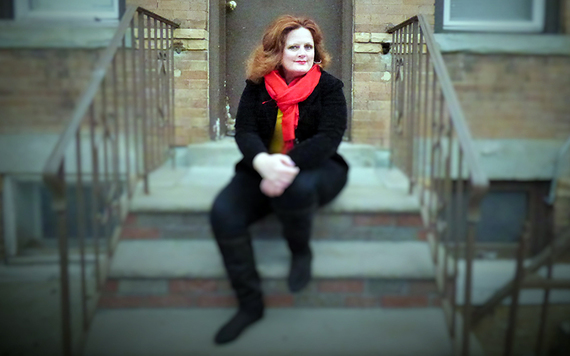
Searching to find some clarity in the past - Kathleen Maloney visiting her old apartment in NJ.
It was then I realized the extent of what my father went through. The fear he must have felt leaving for work each day and leaving his children with his unstable wife but knowing he had to earn a living. He was both father and mother to me and my sister. His endless and steadfast love, support and commitment to his family ensured I would grow up to become a confident woman.
How do you thank someone for that? The reverence I have for my father is immeasurable. And, like my Dad, there are many heroes out there caring for people with mental illness. While we've come a long way in the mental health field there is still so much more that needs to be done to help families who are going through the same.
Untreated mental illness affects the entire family and can bring chaos to even the most peaceful of homes.
My parents' love story was interrupted by an untreated mental illness. I hope they are together again and happily making up for lost time. I hope their love story goes on forever.
* Originally published in Oct 2017. Updated in 2022.
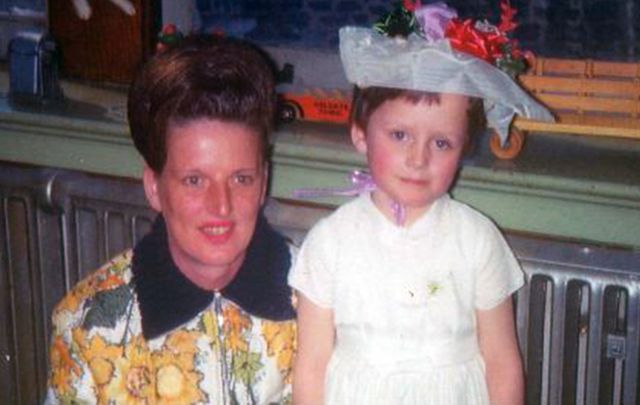



Comments